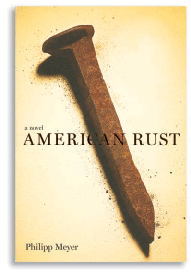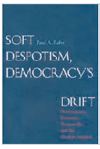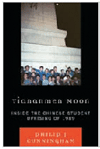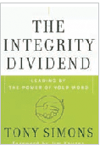American Rust by Philipp Meyer '99 (Spiegel & Grau)
American Rust by Philipp Meyer '99 (Spiegel & Grau)

In Meyer's debut novel, two friends, Isaac English and Billy Poe, have been marking time after high school in their dying Pennsylvania steel town. Isaac steals money from his father to bankroll his escape to California. He encounters Billy on the edge of town, and the friends stop in a ruined factory to get out of the rain. But things go terribly wrong when Isaac unintentionally kills a homeless man who attacks Billy. Meyer, a former fellow at the Michener Center for Writers, tells the story from the perspective of different characters, and is adept at both poetic and gritty details.
Soft Despotism, Democracy's Drift by Paul A. Rahe '71 (Yale). The end of the Cold War seemed to signal the triumph of democracy over totalitarianism, yet a spirit of uneasiness has settled over the United States and other democracies since 1989, argues Rahe, professor of history and political science at Hillsdale College. He questions whether the U.S. "still possesses the spiritual resources, the prudence, and the resolve" to play its role as world leader. He sees in the political ideas of Montesquieu, Rousseau, and Tocqueville a warning about the tendency of state power to undermine the spirit of self-government. "We have no grounds for the complacency that we so often evidence."
Songs for the Missing by Stewart O'Nan, MFA '92 (Viking). After eighteen-year-old Kim Larsen disappears on her way to work, her parents and younger sister struggle with the unknown. Her father's usual diligence proves worthless in the search for his daughter. Kim's mother pursues routine to stave off panic. Her sister, Lindsay, buries herself in books, music, and the computer—anything to avoid her parents' smothering protectiveness. The book seems to be a classic thriller at first, but O'Nan sidesteps genre conventions, focusing instead on how the family members endure the heart-rending, numbing, consuming process of searching for a lost child.
Tiananmen Moon by Philip J. Cunningham '76 (Rowman & Littlefield). Cunningham, now a professor of media studies at Doshisha University in Kyoto, was both a freelance journalist and a participant in the student movement during the demonstrations and subsequent massacre in Tiananmen Square in 1989. He provides a day-by-day account of the students' tactics as they pressed for democratic reforms. Cunningham portrays the atmosphere of the historic month in Tiananmen Square, from the euphoric beginning to the ultimate crackdown, and gives an insider's look at the role Western media played in bringing the story international attention.
The Integrity Dividend by Tony Simons (Jossey-Bass). "When a leader says something and fails to visibly follow up with action, it costs that person credibility," writes Simons, an associate professor of management and organizational behavior at the School of Hotel Administration. "The credibility of leaders makes or breaks companies." Simons explores the deeper implications of the commonsense idea of doing what you say you will do and asserts that by following through on promises leaders are more trusted and more effective, they have more loyal employees, and their businesses earn more money—"the dollar value of an impeccable word."




Recently Published
Fiction
The Cradle by Patrick Somerville, MFA '05 (Little, Brown). In his first novel, Somerville weaves together two story lines: in 1997, pregnant Marissa sends her husband, Matt, to search around the Midwest for a missing family heirloom, the cradle she used as a child; and in 2008, on the eve of her son Adam's departure for Iraq, Renee feels compelled to reveal a secret from her past.
Where It Lies by K. J. Egan '74 (Minotaur). Golf pro Jenny Chase investigates an apparent suicide that turns out to be murder. First novelist Egan is the winner of the Washington Irving Book Award for Fiction and a finalist in the New York Law Journal Fiction Contest.
The Baseball Card Kid by Adam Osterweil '94 (Front Street Books). In the sequel to The Comic Book Kid, two boys journey back in time to find the rarest baseball card—the Honus Wagner tobacco card, first issued in 1909. Their adventures take them from the Titanic to Transylvania and the mysterious planet Earth 2.
How To Buy A Love of Reading by Tanya Egan Gibson '89 (Dutton). Thirteen-year-old Carley Wells hates words. Her parents take drastic measures and move novelist Bree McEnroy into their Long Island mansion to write a book that Carley will have to love.
Poetry
The Second Night of the Spirit by Bhisham Bherwani '90 (CavanKerry). Bherwani grapples with the themes of self-identity, grief, and guilt, and their interplay with migration and politics in his debut collection. Taking his title from the work of St. John of the Cross, Bherwani brings light to personal tragedy.
Dusk at St. Mark's and Other Poems by Dylan Willoughby '92, MFA '95 (Chester Creek). A limited, illustrated edition by a writer-in-residence at the Yaddo artists' colony.
Non-Fiction
Rethinking Rights edited by Bruce P. Frohnen, PhD '88, and Kenneth L. Grasso (Missouri). The editor of the Political Science Reviewer and a professor of political science at Texas State University argue for a reconsideration of the origins, nature, and role of rights in public life.


